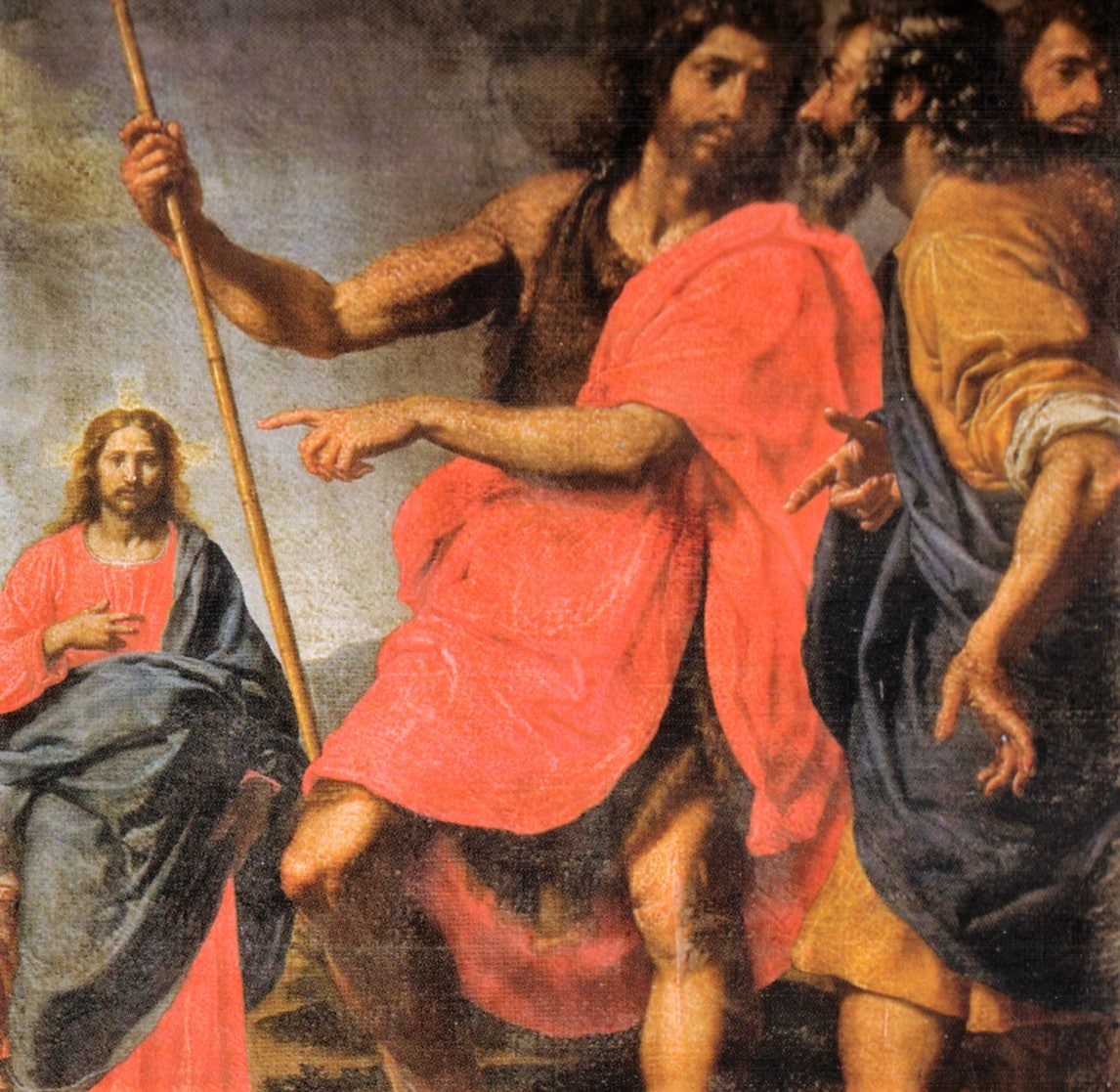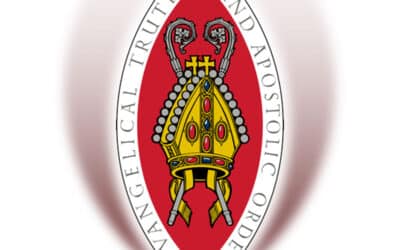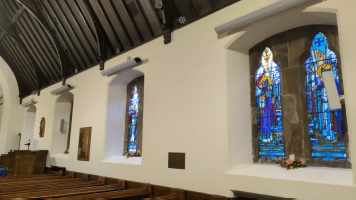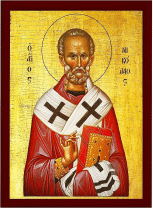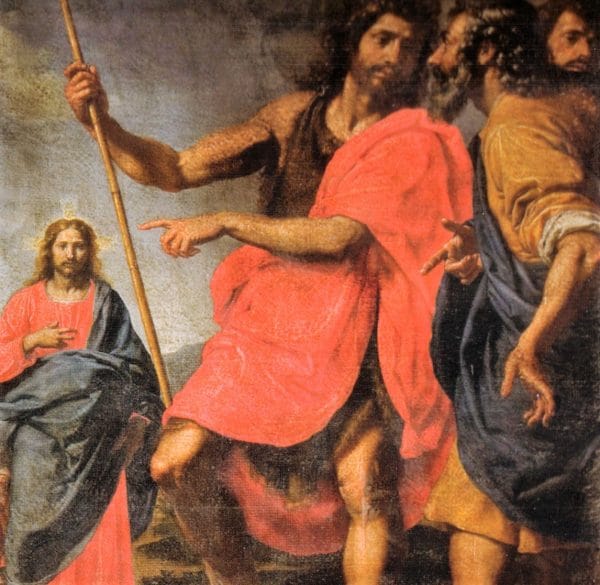
Hear the gospel of our Lord Jesus Christ according to Mark.
Glory to Christ our Saviour. The beginning of the good news of Jesus Christ, the Son of God. As it is written in the prophet Isaiah, ‘See, I am sending my messenger ahead of you, who will prepare your way; the voice of one crying out in the wilderness: “Prepare the way of the Lord, make his paths straight” ’,
John the baptizer appeared in the wilderness, proclaiming a baptism of repentance for the forgiveness of sins. And people from the whole Judean countryside and all the people of Jerusalem were going out to him, and were baptized by him in the river Jordan, confessing their sins. Now John was clothed with camel’s hair, with a leather belt around his waist, and he ate locusts and wild honey. He proclaimed, ‘The one who is more powerful than I is coming after me; I am not worthy to stoop down and untie the thong of his sandals. I have baptized you with water; but he will baptize you with the Holy Spirit.’
Give thanks to the Lord for his glorious Gospel.
Praise to Christ our Lord.
Sermon
When you think about good news, your mind might fix on the vaccine being rolled out this week and the promise of some normality returning. Or you might think of recent good news enjoyed in your family life, such as the birth of a baby or arrangements coming together for a family Christmas. All of us are waiting for good news; for a bit of hope, purpose and meaning particularly in troubled times. And that is okay, in fact it’s more than okay – it’s brilliant. Enjoy these positive stories to their full, particularly after the year we have had. Let that feeling of relief that a vaccine has been found and will be delivered wash over you. Give thanks to God for all good things. But beware that you don’t make these individual positive news stories, into what they’re not: your ultimate hope for life.
God’s good news as shared by Mark is not one nice or hopeful story among many, but the ultimate and decisive moment of positivity and hope for all. It’s not a temporary fix, but a permanent change. It will last beyond time and into eternity. It affects everybody and everything we experience. At this moment when the biggest problem in the world seems to be the virus, we are in danger of treating the vaccine like it’s solution to all of our problems. Yes, a vaccine will get us back to some kind of normal, but normal – if you can remember that far back – although better than now, was never quite as fulfilling, sweet and perfect as any of us wanted it to be. At the end of this virus, we’ll remain in need of God’s good news, otherwise we’ll keep fixating our hopes on the rollercoaster of changing headlines or the ups and downs of our own personal stories.
When Mark announced God’s news, he had in mind more than the new or the old normal. He didn’t describe an event which will occur one day and pass the next; nor did he expect a sticky plaster for the vast and deep spiritual problems of the world, which led societies to abuse nature and wildlife, resulting in a pandemic. The good news for Mark is not a self-help or political project; a lesson to be learned, a lifestyle or morality to be practiced where we become the solution to our own problems, we need more than that. We need the announcement that Jesus Christ is the Son of God.
The reason Jesus is the good news is found in his very name. Jesus as a word: means God saves. Christ means the anointed one, God’s chosen king. Son of God reveals that he is special – sharing in the Father’s divine nature, in a way that no one else can claim to. The divine, saving and loving power of God has all been centered, focused on and delivered to the world in one person; Jesus Christ, born as a human being in Mark’s time. The decisive shift in the world has already happened. The hope you’ve been projecting on to future life events or news articles, first must be rooted and grounded in that person, born in that time, with that name that means saviour, king, and God. Only then can all the other smaller good news stories, like news of a vaccine, be properly understood and enjoyed for what they are – positive, but not salvation. Our expectations for what can be achieved are usually highly inflated when it comes to personal goals or scientific progress, but low when it comes to what God achieved in Jesus Christ. What God’s news calls for is a flip in our estimation of ourselves and of God otherwise disappointment is inevitable.
For that reason, John the Baptist appears in the wilderness and begins to prepare the people for Jesus’ ministry. There in the wilderness, people go out to repent, confess their sins, be baptised and gain forgiveness. People from the countryside and city – people from every class and interest group from across the Jewish nation go out from their comforts into the wilds. They escape from everything – the illusions and distractions of work, money, status – to clearly see themselves for who they are and God for who he is. It’s this desert experience that readies them to truly appreciate the good news when he comes: the person of Jesus and a new relationship with God through him. It was faithful religious Jews going out to the desert to experience renewal. God meets them there, in an inconvenient, different and hard place – but equally a place where things are laid bare – made clear. This year, we’ve had to stay away from our church building, worshipping at home. We’ve had to learn new ways to worship, adapting to wearing masks and keeping our distances in church. Many of the activities we did have been stripped down or cancelled during these restrictions – including singing and socialising – and yet God continues to meet us and helps us to see Jesus more clearly, more fully in our wilderness and isolation.
The shift from focusing on our efforts to those of Jesus is summed up in an old fashioned word: repentance. A word that raises alarm bells of: endless guilt, intolerant street preachers and gloom. But the word simply means to change or transform your perspective so that you see things truly as they are – a scary prospect sometimes. It’s switching on the lights, getting the steam off your glasses now and again so you can focus – something we’re all used to with wearing masks. It’s a constant process, even for the most faithful among us. It’s being open to see and know yourself honestly, being grasped by the infinite value and love of Jesus and recognising the world as it is – full of distractions from God, but also full of pointers to him.
Sin then is more than doing wrong like lying or gossip – that’s just the surface behaviors. Sin is a lack of knowledge; an inner blindness; an upside-down picture of who we are compared to God that needs to be flipped the right way up, with God first. John the Baptist himself gives us a perfect picture of repentance when he points away from himself towards Jesus and says, ‘compared to him, I’m not even worthy to carry Jesus’ dust filled sandals. Jesus is the good news here, not me.’.
Whilst we’re still in the wilderness this advent, whilst here still going through hard times – living and praying in different ways – let John’s attitude and perspective become your own. Be prepared to renew your relationship with the good news – the person of Jesus who wants to be seen and known by you, as salvation, hope, and God, realising that you are not the centre of things and neither do you need to be.
This advent, with a clear view of ourselves and of our Lord Jesus Christ, let us confess our sins in penitence and faith:
Silence
God our Father, we confess to you and to our fellow members in the Body of Christ that we have sinned in thought, word and deed, and in what we have failed to do. We are truly sorry. Forgive us our sins, and deliver us from the power of evil. For the sake of your Son who died for us, Jesus Christ, our Lord.
God, who is both power and love, forgive us and free us from our sins, heal and strengthen us by his Spirit and raise us to new life in Christ our Lord. Amen.
